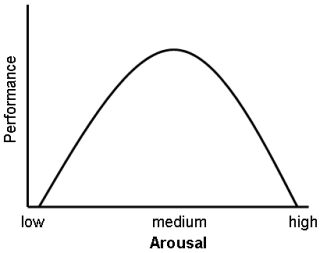Stress
Why Some Experts Believe Stress Can Aid Performance
A little anxiety from time to time can be beneficial for task performance.
Posted January 11, 2023 Reviewed by Vanessa Lancaster
Key points
- The Yerkes-Dodson law states that anxiety improves performance until we reach an optimum level of arousal.
- Finding the right balance of stress is key to performance. Too much or too little is not good.
- Building confidence and mental toughness are optimal for top performance.
"A little anxiety from time to time can be beneficial to task performance…[as] illustrated by the Yerkes-Dodson law, which states…performance is improved by anxiety until an optimum level of arousal is reached."

That quote, by psychologist and author Clifford B. Dobson as referenced in Yerkes-Dodson: A Law for All Seasons, might best explain why Garry Kasparov became World Chess Champion and John McEnroe won seven Grand Slam tennis championships by age 25, despite their performance stress.
Psychologists Robert Yerkes and John Dillingham Dodson developed the stress-and-performance concept now referred to as the Yerkes-Dodson Law. As a result of rodent experiments, Yerkes and Dodson concluded that an optimal stress level aids goal achievement. Too little stress and an individual lacks the incentive, motivation, and needed arousal to exceed, to go “above and beyond.” Too much stress interferes with judgment and attention, hinders cognition and decision-making capabilities, and creates an unhealthy anxiety that often leads to failure, these psychologists proposed.
Many scientists agree that a certain level of stress is necessary to prompt a person to achieve peak performance, whether playing chess, competing in a tennis match, or simply completing a complicated task on a deadline at work.
Authors of a study published in eLife even suggest that a certain amount of stress may be beneficial to brain plasticity. Specifically, these researchers write that acute stress may provide neurological benefits similar to exercise. Stress prompts the release of specific hormones and other biochemical factors that stimulate neurogenesis – the birth of new neuronal cells – in the hippocampus. Hippocampal neurogenesis supports memory consolidation, adaptability to the surrounding environment, and overall brain health. “Stress can be a potent modulator of the mammalian brain,” they state.
Other investigators, however, criticize the Yerkes-Dodson Law as being too simplified. What works with rodents does not necessarily apply to humans, they say. Stress is only one variable affecting performance. Multiple characteristics of human nature, such as personality traits, self-development, creativity, emotion, risk-taking tendencies, and mindset, also come into play.
Confidence, Resilience, and Mental Toughness
Both Kasparov and McEnroe demonstrated the necessary mental toughness, resiliency, confidence, and mindset to become winners, despite their occasional, seemingly stress-related displays of aggression, anger, or emotion during play. In fact, Kasparov later wrote a book on how to build confidence, credting his regain of confidence for enabling him to outplay Anatoly Karpov during a final match to retain his chess title. And in a 2022 documentary about his career, McEnroe indicated that his emotional outbursts were not about anger but were “coping mechanisms” to deal with pressures on and off the court.
In a 2016 study of South African tennis players, authors found “resilience and mental toughness are associated with effective adaptation, coping, maintaining functioning or performance, and achieving despite experiencing adversity, pressure, setbacks, or stress.”
Scientist Gill Windle described resilience in his review and concept analysis as "the process of effectively negotiating, adapting to, or managing significant sources of stress or trauma. Assets and resources within the individual, their life and environment facilitate this capacity for adaptation and ‘bouncing back’ in the face of adversity."
Perhaps the constant exposure to stress – not just a certain level of stress – contributed to the ability of competitors like McEnroe and Kasparov to cope with their environments, blot out distractions around them, focus, and develop the confidence that allowed them to perform at peak levels.
When Stress Proves Too Much
But what is considered an optimal stress level, and when does stress move from beneficial to unhealthy overload? Many scientists agree the answer may well depend on each individual’s personality, prior experiences, and ability to manage stress, as well as the presence of other physiological and psychological issues.
Competitive anxiety and intense concentration may have triggered 67-year-old Kurt Meier’s collapse and death as a result of a stroke during the 2014 Chess Olympiad in Norway. Earlier, in 2000, Latvian Vladimir Bagirov suffered a fatal heart attack in a chess tournament in Finland. Meanwhile, other noted chess players, known to suffer from depression and anxiety, have committed suicide or been hospitalized for psychiatric disorders. Both Alvis Vitolins and Karen Grigoryan, for example, jumped from bridges. Historians indicate Grigoryan would often become “dejected and depressed” following a loss.
Of course, stress overload goes well beyond chess. Grand Slam champion tennis player Naomi Osaka and Olympic champion gymnast Simone Biles both cited mental health issues in their decisions to walk away from their beloved sports, at least temporarily. Both may be examples of what some researchers call stress-induced exhaustion disorder.
In a 2021 study published in BMC Psychiatry, scientists defined stress-induced exhaustion as a “disorder characterized by severe fatigue, decreased tolerance to further stress, attention, and memory lapses.”
Spanish behavioral neuroscientist Carmen Sandi may have best summarized the effects of stress and performance in her article in Wiley Interdisciplinary Reviews – Cognitive Science:
"Mild stress tends to facilitate cognitive function, particularly in implicit memory or simple declarative tasks or when the cognitive load is not excessive. Exposure to high or very high stress acutely…or chronically impairs the formation of explicit memories and, more generally, of those that require complex, flexible reasoning (as typically observed for hippocampus- and prefrontal cortex-related functions) while improving performance of implicit memory and well-rehearsed tasks."
Building Confidence and Mental Toughness
As Sandi noted elsewhere, “the view you adopt for yourself profoundly affects the way you lead your life.” If you are mired in self-doubt and timidity, meet challenges with uncertainty, wring hands over “what-ifs,” and let anxious emotions control your mind, you cannot be successful. Here are some tips to consider for developing mental toughness:
- Think positively. A sign posted inside a Chicago-area tennis club reminds players: “If you think you can’t win, then you won’t.”
- Strengthen visualization skills. Imagine an upcoming situation, project deadline, or competition. Mentally consider what must be done to succeed – to achieve, to meet goals – so that your mind and attitude are prepared.
- Practice mindfulness. Cognitive restructuring specialist Donalee Markus, Ph.D., president of Designs for Strong Minds in Highland Park, Illinois, referred to mindfulness as a “state of being ‘present in the moment’ and controlling the inner dialog that prompts one’s thoughts to wander.” Mindfulness enhances concentration and focus and helps one avoid becoming mentally entangled in distractions within one’s surrounding environment.
- Do not be afraid to lose. Failures provide the needed learning and experience for future success.
- Be confident in your skills. Know that “you got this.”
- Eat nutritiously and get a sufficient amount of sleep. A healthy body begets a healthy mind.
To find a therapist near you, visit the Psychology Today Therapy Directory.




